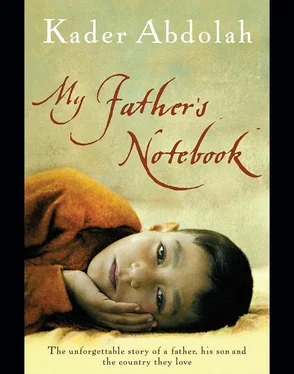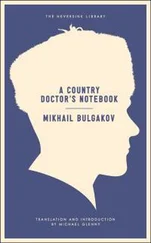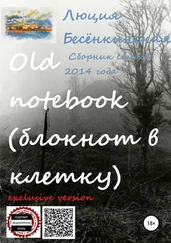Akbar worked as hard as he always had and gave all of his earnings to Tina, leaving household matters and the raising of the children to her. He still travelled a lot. Sometimes he was gone for a week or even longer.
“Where’s Akbar?”
“Working.”
“Where?”
“On the other side of the mountain.”
“He has enough customers here. What’s he doing on the other side of the mountain?”
No one knew exactly where he went. Or who he slept with. (There’s no reference to this in his notebook.)
I don’t really know what Tina was doing in those days or how she dealt with Akbar. Nor do I know what the first few months of her marriage were like. She never discussed it.
“Mother, how did you learn sign language?”
“Oh, I don’t know. It was so long ago, I’ve forgotten.”
“Wasn’t it hard, suddenly having to live with a man you couldn’t talk to?”
“I don’t know, it was all so long ago.”
She never mentioned her own mother and father. It was as though she didn’t have any family, as though she were an orphan, nobody’s daughter. Everything I knew about her I had learned from Kazem Khan.
“Was your father a hunter?”
“Yes.”
“What about your mother? I don’t know anything about her.”
“I don’t, either. She died when I was very young.”
In fact, her childhood, youth and first years of marriage had been neatly tied into a bundle and tucked away. “I don’t know” was her standard reply.
I stopped asking questions. But now that I live in the polder and take walks along the dyke, these questions occur more often.
I don’t want to get bogged down in the past, but until you’ve come to terms with it, you can’t really settle into a new culture.
That’s why I’ve become so engrossed in my father’s notebook. After all, his story is also my story. If I can transform his writing into Dutch, I’ll be able to adjust to my new culture more easily.
During yesterday’s walk, I thought back to that first meeting between Tina and Kazem Khan. To the scene in which Kazem Khan rides around in search of the hunter so he can smoke opium and Tina clears snow from the roof.
I now wonder how much of that story is true. Perhaps Kazem Khan made it up, since the Tina in the story bears little resemblance to my mother.
Perhaps he exaggerated a bit and turned Tina into his dream woman.
Tina was a good mother and she had a strong personality, but she was definitely not the Tina on the roof.
She got fed up with Akbar sometimes and buckled under the weight on her shoulders. One incident stands out clearly in my mind:
Kazem Khan came into our house. Tina screamed, “I can’t stand it! I can’t live with that man one day longer!” Then she began to beat herself over the head and kept it up until she fainted.
Kazem Khan grabbed her by the shoulders and dragged her to bed.
“The Holy Book,” Kazem Khan murmured.
I took the Koran down from the mantel and handed it to him. He knelt in front of Tina’s bed and read from it softly: “ Eqra: be-asme rabbeka alazi khalaqa. Khalaqa al-ensana min allaqin. Eqra: wa rabbok al-akram, alazi allama be el-qalam .”
As I walked along the dyke, I recalled another scene from that same period:
A covered wagon creaked into view. My father was at the reins. He drove through the gate of our house, said nothing to Tina, but signed to me, “Come! I need your help!”
He unhitched the horse and led it to the stall. Then he pushed the covered wagon into the barn, where he spent the entire evening. Tina was restless. She knew that something was about to happen, but she also knew she was powerless to prevent it.
“What’s your father doing?” Tina called.
“I don’t know. The door’s locked from the inside.”
He stayed in the barn until late that night.
Early the next morning I woke to the sound of an angry voice in the courtyard.
“What do you think you’re doing?” Tina screamed at Akbar.
I leapt out of bed and looked out of the window. My father had crammed all of our carpets, blankets, buckets and pots and pans into the covered wagon and was now going inside to get my sisters, who were still in bed.
“Help, Ishmael! Go and get—” Tina called.
I raced downstairs and ran all the way to Kazem Khan’s house in my bare feet. “Come quickly, Uncle,” I shouted. “My father’s gone mad.”
Here in the polder I hear the hoofbeats of Kazem Khan’s horse as it galloped into our courtyard.
“Where’s Akbar?” called Kazem Khan.
My father had laid my still-sleepy sisters in the wagon and covered them with a blanket. Kazem Khan swiftly dismounted and gestured to my father with his crop, “Come here!”
My father didn’t budge.
“What on earth are you doing?”
He didn’t answer.
“What’s going on in that head of yours?”
“We’re moving to the city,” my father signed.
“Have you discussed this with Tina?”
No response.
“Why didn’t you tell me?”
No response.
Kazem Khan pointed to the wagon. “Unload it! Take everything out!”
Tina took me inside so I wouldn’t have to watch.
“You’ve got four children now,” I heard Kazem Khan say angrily. “But you still do stupid things! Unload this wagon!”
I thought my father would start lugging carpets and blankets back inside, but he didn’t.
“Unload it, I said!”
I peeked out from behind the curtain.
Akbar signed to Kazem Khan that he was going to move to the city no matter what and that he had no intention of unloading our things.
Kazem Khan stood helplessly beside the wagon. Then he stuck his crop under his arm and strode over to his horse. He grabbed the reins and led the horse to the gate.
“Kazem Khan is leaving,” I said to Tina.
She pushed aside the curtain. She looked miserable.
Kazem Khan paused by the gate. His head was bowed. Then he turned and called, “Ishmael!”
I ran out to him.
“Here,” he said, handing me the reins. “Take the horse to its stall. I’m old. Your father will no longer listen to me. I’ve lost whatever hold I had on him.”
I took the horse to its stall and raced back outside.
“Listen, your father wants to move to the city and I can’t stop him. I’m going into the house to talk to your mother. Keep an eye on your father.”
“Tina,” Kazem Khan called, “how about a cup of tea?” And he went in.
“Akbar’s determined to move to the city,” I heard him say. “You mustn’t be so weak. There’s no need to cry and scream and beat yourself over the head every time something happens. Give me a cup of tea, my throat’s dry. Ishmael, go and get your father!”
Kazem Khan sat down. Tina set a cup of tea in front of him. I brought my father into the house and stood beside him.
“Ask him why he wants to live in the city,” Kazem Khan said to me.
“Why the city?” I signed. “Why do you want to go there?”
“Me, Akbar,” he signed, “I want to go where there are cars and—”
“Cars!” Kazem Khan exclaimed. “He’s been bewitched by cars!”
“And schools,” my father signed. “A school for Ishmael. And for the girls. The girls need to go to school.”
“Schools?” Kazem Khan said in surprise. That wasn’t the answer he’d expected. “Cars. Schools. You want them to go to school? To move to the city? A deaf man with four children in the middle of a strange city with all those cars?”
“I’m deaf,” my father signed, “but Ishmael isn’t deaf. The girls aren’t deaf. And Tina isn’t deaf either.”
Kazem Khan was silent.
“Did you see that?” he said to Tina. “You shouldn’t come running to me before you find out what’s going on. Your husband wants to send your children to school. Don’t look so unhappy. Stand up straight! Support your husband! He may be deaf, but he’s not stupid. At least he thinks about things. Give me another cup of tea. This one is cold.”
Читать дальше












